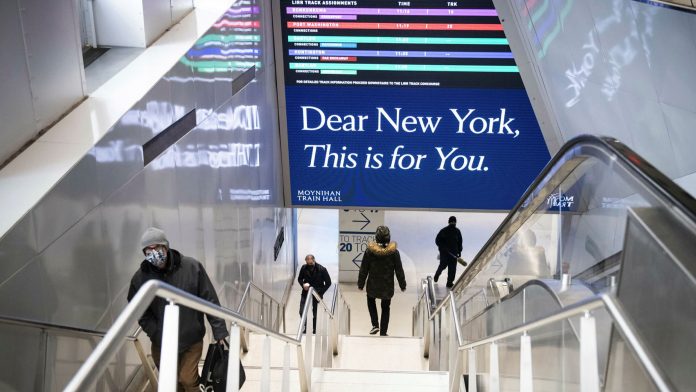Joe Biden pleaded for Congress to “act now” on a new $1.9tn economic rescue plan, setting it up as his top legislative priority as he prepares to enter the White House next week.
The plan, announced by the president-elect on Thursday evening in Delaware, includes new direct payments to Americans, aid for state and local governments and more funding for the coronavirus pandemic response.
If enacted, the package will deliver a further jolt of fiscal stimulus to the struggling US recovery, after a $900bn package agreed last month by US lawmakers and $3tn in relief passed at the start of the pandemic.
The push from Mr Biden comes as he tries to shift attention back to the economy and the Covid-19 crisis just a day after Washington was consumed by President Donald Trump’s second impeachment for inciting a deadly assault on the US Capitol on January 6.
On Thursday morning, concerns about the state of the US recovery resurfaced after an unexpected jump in first-time weekly claims for jobless benefits, adding impetus to Mr Biden’s calls for fresh stimulus.
If Mr Biden is successful in his bid for a new large-scale fiscal package, it could help sustain the recovery for most of his first year in office, but should he fail, it could slow down America’s rebound just as more of the general population is vaccinated in the spring.
“A crisis of deep human suffering is in plain sight. There’s no time to waste. We have to act and we have to act now,” Mr Biden said.
The plan is expected to mark the first step in Mr Biden’s economic response to the coronavirus downturn, with additional recovery measures to be presented as early as next month.
The second stage of Mr Biden’s economic agenda is expected to call for longer-term spending on infrastructure, green energy and education, to be funded at least partially by higher taxes on the wealthy and corporations.
The main elements of Biden’s stimulus plan
$465bn – Direct stimulus payments to individuals of up to $1,400 each
$350bn – Aid to state and local governments
$350bn – Extension of emergency jobless benefits of $400 per week
$170bn – School and university reopening funds
$160bn – Coronavirus vaccination, testing and tracing funds
$120bn – Child tax credit expansion
$250bn – Combination of other policy changes
Source: Analysis of plan by Committee for a Responsible Federal Budget
Democrats in Congress are widely expected to back the stimulus. Mr Biden’s party already has a majority in the House of Representative and is set to clinch control of the Senate after winning two races in Georgia earlier this month.
“We will get right to work to turn president-elect Biden’s vision into legislation that will pass both chambers and be signed into law,” Chuck Schumer, the top Democrat in the Senate, and Nancy Pelosi, the House speaker, said in a statement.
The incoming president is also hoping to secure support from some Republicans, many of whom are hesitant to approve more government funding and wary of handing Mr Biden any quick legislative victories. Kevin Brady, the Texas Republican and his party’s top member of the House Ways and Means committee, speedily dismissed the plan as “yet another economic blind buffalo that does nothing to save Main Street businesses, get people back to work, or strengthen our economy”.
But even after the tensions and divisions of Mr Trump’s presidency, including those of the past week, Mr Biden said it was still possible to get a bipartisan compromise.
“Unity is not some pie in the sky dream. It’s a practical step to getting the things we have to get done as a country, get done together,” he said.
Mr Biden’s $1.9tn plan, which will be entirely financed by new borrowing, includes a new payment of $1,400 to most Americans, supplementing the $600 cheques recently received by individuals earning less than $75,000 per year. That would bring the total value of recent direct payments to $2,000, the level backed by both Mr Trump and Mr Biden in recent months.
It includes a $400 per week extension of emergency unemployment benefits until September, preventing a cliff-edge in support for the jobless that would have happened in March.
There will also be a $350bn cash infusion for budget-strapped state and local governments to prevent lay-offs of public sector workers, a priority for Democrats that has been long-resisted by Republicans.
A further $50bn will be set aside for grants and loans to struggling small businesses, on top of the Paycheck Protection Program established during the pandemic to prevent small business failures, which was recently replenished by Congress.
A big component of Mr Biden’s rescue plan is $400bn of new spending to tackle coronavirus, including $160bn for testing and tracing, as well as a national vaccination programme that could help the administration meet its goal of inoculating 100m people within its first hundred days.
Also in the mix is $130bn to accelerate school reopenings across the country.
The US Chamber of Commerce, America’s largest business lobby group, was broadly supportive. “We applaud the president-elect’s focus on vaccinations and on economic sectors and families that continue to suffer as the pandemic rages on,” it said, adding: “We look forward to working with the new administration and Congress on the details and in ensuring that any additional economic assistance is timely, targeted, and temporary.”
Mr Biden is also expected to call for Congress to increase the federal minimum wage to $15 per hour, a Democratic priority for many years that is backed by labour unions.
And he will push for an expansion of the child tax credit, an extension of a federal moratorium on evictions and foreclosures until September, while providing $30bn in assistance for Americans struggling with rental and utility payments.





